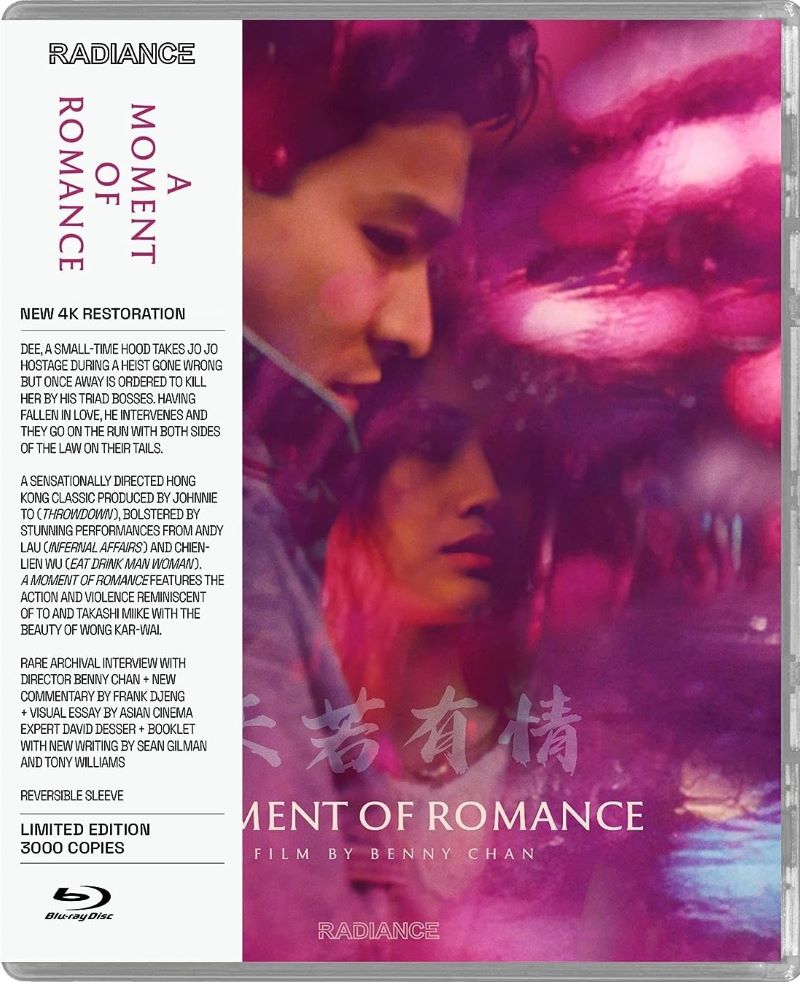
When a bank heist goes awry, getaway driver Wah (Andy Lau) grabs the closest civilian as a hostage as he escapes from the cops. That civilian turns out to be an innocent, shy young lady named Jo Jo (Chien-Lien Wu), who instead of recoiling in fear after her ordeal finds herself drawn to the dangerous young thug. Wah is a tough Triad with no real future and no plans to change, and yet she can’t resist trying to help him, seeking him out even after he’s released her.
Although the suave, pop-singing Lau struggles to pull off his gutter punk Triad character, his leading man magnetism shines through and adds to the believability of why Jo Jo would take an interest in him. Wu is fairly bland, but that plays well into her role. Other gang members and cops orbit the young lovers to set up frenetic action scenes including car chases and shootouts, but for all intents and purposes, this is a two-hander focused on the unlikely love story between gruff kidnapper and meek ingénue.
A Moment of Romance was produced during Benny Chan’s transition from Johnnie To’s assistant director to a full-fledged feature film director on his own, and while it is credited solely to Chan, the film was reportedly jointly directed with To. This explains why the production seems so slick and polished, although it’s difficult to spot any directorial dividing lines or difference in quality from scene to scene, especially since both men went on to decades of accomplished film direction. Chan’s knack for kinetic action ramped up here, soon to translate to continued popular success with essential projects such as Gen-X Cops, New Police Story, Shaolin, and all the way through to his fun final film from a couple of years ago, Raging Fire, released after his unfortunate early passing from cancer.
The new Blu-ray from Radiance Films features a new 4K restoration from the original camera negative, with further color correction and soundtrack restoration by Radiance. The results are stunning, especially for viewers who recall what DVD and VCD releases of HK films looked like decades ago. The image clarity is especially superior, nearly eliminating the urban haze that seemed to permeate every HK production of the era. Even night scenes are crisp and clearly defined, while fast action shows no artifacting and colors exhibit richly saturated, lifelike tones. The uncompressed mono PCM audio is also in great shape, with no discernible defects.
Extras include a lengthy archival audio interview with Chan, made all the more poignant by his recent death. A new visual essay is contributed by a critic and Asian cinema expert, along with a commentary track by another expert. The 3000-copy limited edition also includes a 28-page booklet with stills, a new essay about the cast and crew, and a profile of Chan. As typical with Radiance’s introductory batch of releases, the reversible sleeve features original and newly commissioned artwork, and the descriptive band can be removed and discarded for label-free presentation.
While the love story plot is far-fetched, and To’s directorial involvement muddies the waters regarding Chan’s role, it’s a delight to watch the fairly young Lau further establishing his legendary career in this project that largely set the stage for Chan’s three decades of film direction.